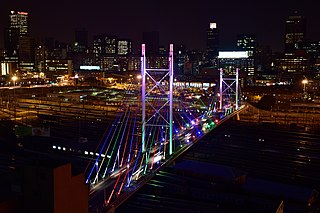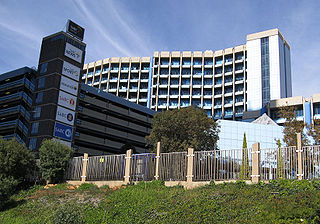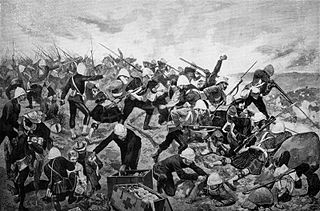
Johannesburg is the most populous city in South Africa with 4,803,262 people, and is classified as a megacity; it is one of the 100 largest urban areas in the world. It is the provincial capital of Gauteng, the wealthiest province in South Africa. Johannesburg is the seat of the Constitutional Court, the highest court in South Africa. Most of the major South African companies and banks have their head offices in Johannesburg. The city is located within the mineral-rich Witwatersrand hills, the epicentre of the international-scale mineral, gold and (specifically) diamond trade.

The University of the Witwatersrand, Johannesburg, commonly known as Wits University or Wits, is a multi-campus public research university situated in the northern areas of central Johannesburg, South Africa. The university has its roots in the mining industry, as do Johannesburg and the Witwatersrand in general. Founded in 1896 as the South African School of Mines in Kimberley, it is the third oldest South African university in continuous operation.

The South African Broadcasting Corporation (SABC) is the public broadcaster in South Africa, and provides 19 radio stations (AM/FM) as well as six television broadcasts to the general public. It is one of the largest of South Africa's state-owned enterprises.

Abdullah Ibrahim, previously known as Dollar Brand, is a South African pianist and composer. His music reflects many of the musical influences of his childhood in the multicultural port areas of Cape Town, ranging from traditional African songs to the gospel of the AME Church and Ragas, to more modern jazz and other Western styles. Ibrahim is considered the leading figure in the subgenre of Cape jazz. Within jazz, his music particularly reflects the influence of Thelonious Monk and Duke Ellington. He is known especially for "Mannenberg", a jazz piece that became a notable anti-apartheid anthem.

The cinema of South Africa refers to the films and film industry of South Africa. Films have been made in English and Afrikaans. Many foreign films have been produced about South Africa, including many involving race relations.

Egoli: Place of Gold was a bilingual South African soap opera which first aired on M-Net on 6 April 1992. South African television's first daily soap opera, on 3 December 1999 Egoli became the first South African television programme in any genre to reach 2,000 episodes. As of 3 August 2007, 4,000 episodes had aired. Egoli: Place of Gold aired its final episode on 31 March 2010, after 18 years of acting from South African and international actors.
Killarney is a suburb of Johannesburg, South Africa. A relatively wealthy area, located west of the M1 freeway, Killarney is a densely built-up area, and it has numerous apartment blocks, as well as a large shopping mall, Killarney Mall.
Springbok Radio was a South African nationwide radio station that operated from 1950 to 1985.

Transnet Freight Rail is a South African rail transport company, formerly known as Spoornet. It was part of the South African Railways and Harbours Administration, a state-controlled organisation that employed hundreds of thousands of people for decades from the first half of the 20th century and was widely referred to by the initials SAR&H. Customer complaints about serious problems with Transnet Freight Rail's service were reported in 2010. Its head office is in Inyanda House in Parktown, Johannesburg.
Julien Laubscher, also known as Julien Cassette, is a South African pop artist; singer, pianist, keyboardist, programmer, producer, musician and actor.
Sonja Herholdt is a South African singer-songwriter and Afrikaner actress.

The mansions of Parktown are an important part of the history of the city of Johannesburg. They were the homes of the Randlords, accountants, military personnel and other influential residents of early Johannesburg, dating back as early as the 1890s. The first of these mansions, Hohenheim was designed by Frank Emley and was built for Sir Lionel Phillips and his wife Lady Florence Phillips. The name Hohenheim had been used originally by Hermann Eckstein, one of the first Rand Lords to name his house after the place of his own birth. When Phillips became the head of Eckstein & Co, he moved in to Eckstein's house but due to the expansion of the city decided to build the new Hohenheim in an enviable site further from the mine workings. Sir Lionel Phillips was banished from the Republic for his involvement in the Jameson Raid. It is perhaps fitting that the next occupant of this famous house was none other than Sir Percy Fitzpatrick, the author of the best selling book 'Jock of the Bushveldt'. The house was demolished but a plaque remains in honor of this building.
Amor Vittone is a South African singer.

Majuba Day(Afrikaans: Majubadag) was a major annual national celebration on 27 February in the South African Republic in the period between the First and Second Boer Wars. The day was named after the Battle of Majuba Hill where on 27 February 1881 the main battle of the First Boer War took place.
Julia Anastasopoulos is a South African artist, illustrator, designer and actress. Anastasopoulos became a local internet phenomenon in May 2014, with her do-it-yourself web series known as SuzelleDIY. Before she became a YouTube personality, Anastasopoulos created hand-drawn illustrations on the walls and windows of a few MyCiTi bus stations.

Joburg Theatre Complex, previously known as the Johannesburg Civic Theatre, is a group of four theatres situated in Braamfontein, Johannesburg, South Africa. It was built in 1962, refurnished in the late 1980s and reopened in the early 1990s before it was re-branded in 2009. It is a venue that stages both Broadway musicals and home-grown productions, and is one of the few theatres open in Johannesburg for independent productions.
David Millin was a South African film director, cinematographer and film producer. He has produced various Afrikaans and English films about his career. He has been a member of the American Society of Cinematographers since 1972, the first member from South Africa belonging to the organization. In 1994 he was honored by M-Net for his lifetime contribution to the industry and in 1997 he was also honored by SASC / Kodak for his contribution. He was famous for his spectacular depictions, large war scenes and his dry sense of humor.

Isidore Williem Schlesinger was a business tycoon and pioneer of the South African Entertainment industry. At 1.58 metres tall, he was nicknamed "Little Man", and was a significant figure in the South African Business world with interests in numerous economic sectors.
Majuba: Heuwel van Duiwe, is a 1968 South African War drama film directed by David Millin and co-produced by Roscoe C. Behrmann and Hyman Kirstein. The film stars Roland Robinson, Reinet Maasdorp, and Patrick Mynhardt in lead roles along with Siegfried Mynhardt, Anna Neethling-Pohl and Morné Coetzer in supportive roles.











